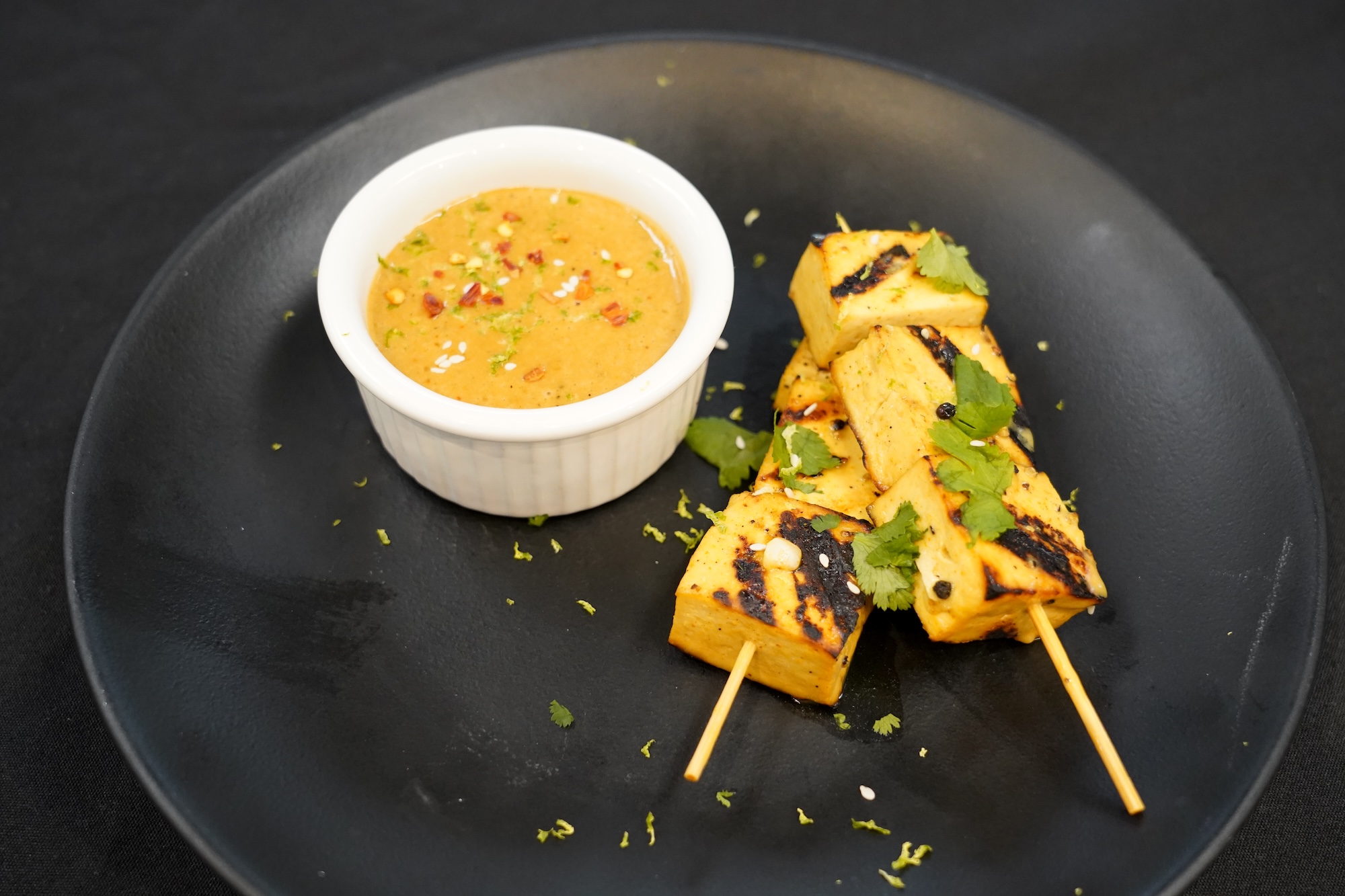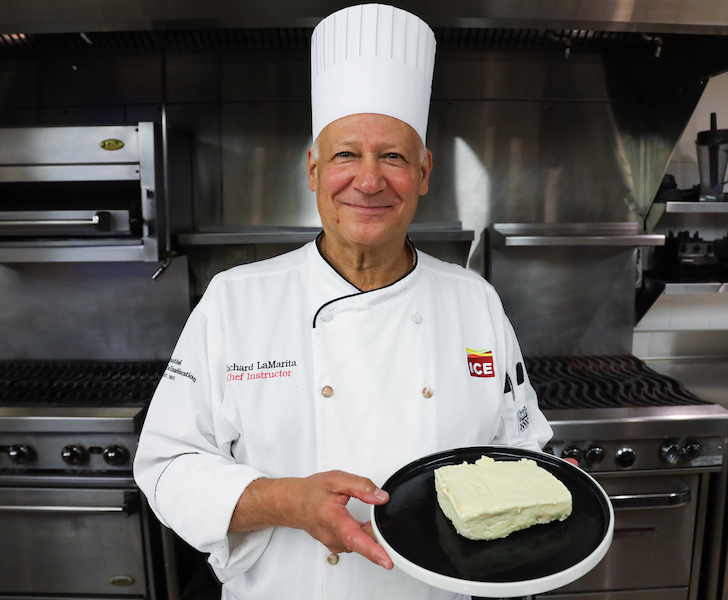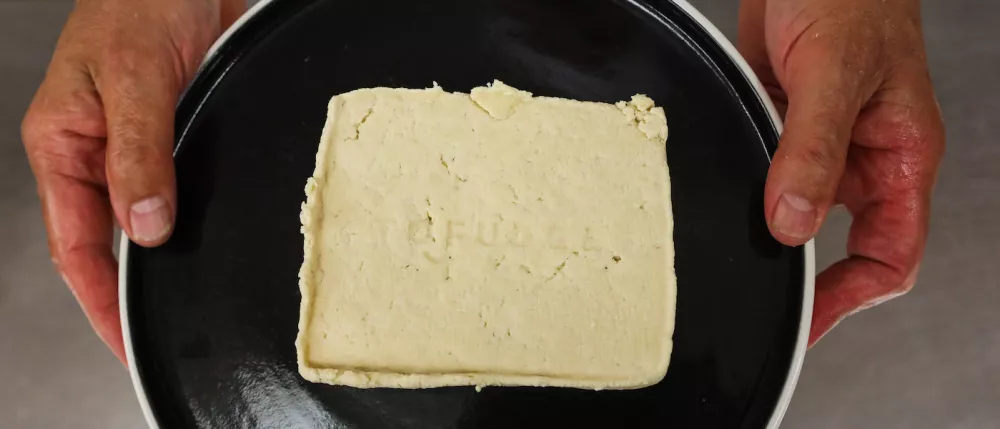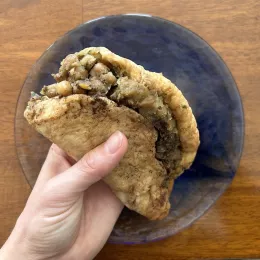Tofu is a unique food. It is a powerhouse plant-based protein, but is somewhat bland on its own and looks like a white, spongy, brick floating in water. Though it may not look like much, tofu's texture and taste (or lack thereof) are its culinary superpowers.
Here’s what you need to know about tofu: how to store it, its health benefits and how to make it at home.
What Does Tofu Taste Like?
Plant-Based Culinary Arts Chef-Instructor Rich LaMarita has lots of experience with tofu. In terms of flavor, tofu tastes a little bit like a bean, but mostly has a neutral profile. In this way, it acts as a blank canvas to soak up flavor, enabling it to be used in sweet and savory dishes.
Chef Rich likes to pair soy sauce and pickled ginger with tofu. For his take on vegan lasagna, Chef Rich whipped up a tofu ricotta, incorporating white miso, lemon, garlic, and umeboshi paste to mimic the flavor of cheese.
Related: Protein Options for Plant-Based Diets
The versatility of tofu isn’t just in its flavor, but also the texture.
“[It] can be manipulated from silky smooth to spongy and meaty,” ICE Director of Nutrition Celine Beitchman says.
There are many different types of tofu available, the most common being firm block tofu and silken tofu. Both have a range of culinary applications.
“Silken tofu can be pureed into smoothies and custards or subbed in for an egg or two in baking,” Chef Celine says. “Firm styles can be roasted, grilled, crumbled, scrambled or formed, and even pan-fried.”

How to Make Tofu
Tofu is made from soybeans. When making tofu at home, white soybeans are soaked overnight in water and then blended with an equal amount of the soaking liquid. Chef Rich recommends using a strong blender like a Vitamix, as the beans will need to blend for one to two minutes, until you’ve reached a smooth consistency.
The mixture is then heated just to a boil and then strained, resulting in fresh soy milk. The pulp that is strained out is called okara, and can be used in baking.
Chef Rich points out that you could stop here and save the soy milk. To sweeten, the milk can be mixed sugar, chocolate or brown rice syrup, which is Chef Rich's preference. Fresh soy milk will only last for about a week in the refrigerator, which is much shorter than store-bought versions due to the absence of preservatives.
To continue with the tofu making process, simmer the soy milk gently to intensify its flavor. Once the mixture is off of the heat, add the coagulant. Chef Rich says that nigari salt is a traditional coagulant, but vinegar is also a good substitute. He uses a solution of one teaspoon of nigari salt dissolved in eight ounces of water, and adds it in thirds, giving the curds time to separate between each addition.
Related: How to Amplify the Flavor of Plants
Once the curds have formed, scoop them into a tofu press to solidify and drain excess liquid. Traditional tofu presses are wooden, but there are plastic models that can make the process easier. They have a crank to push down on the tofu and holes on the bottom for easy drainage.
The tofu is edible right away, and will firm up based on how long the curds sit and compress, which is how soft, medium, firm and extra-firm blocks are made.

How to Store Tofu
Fresh tofu will last in the fridge for seven to ten days. Make sure it is completely submerged in fresh water or it can go bad even sooner, advises Chef Rich.
If you don’t want to eat the whole block at once, simply cut off what you plan to consume and then add fresh water to store it again.
The Health Benefits of Tofu
From a nutrition perspective, Chef Celine says “three ounces of tofu – about the size of a deck of cards, have as much protein as one egg. The firmer the style, the more protein the tofu has.”
Chef Celine also touts tofu's calcium and iron density as huge bonuses.
“When we think about good food sources of calcium and iron, we typically think of animal foods," Chef Celine says. "But three ounces of tofu has as much calcium as 10-12 ounces of milk, and as much iron as three ounces of steak.”
Even though there are only two ingredients, make sure to plan ahead because the tofu making process takes time.

Ingredients
- 14 ounces (400 grams) dried white soybeans, soaked overnight in 3 quarts (3 liters) water, and drained with soaking liquid reserved
- 2 teaspoons nigari salt
Special Equipment:
- Fine chinois
- Cheesecloth (rinsed)
- Tofu press
Directions
- Line a tofu mold with two layers of wet cheesecloth. Set aside.
- Heat a quart of the reserved soaking liquid in a 2-gallon pot over medium-high heat.
- Puree soybeans in two batches with remaining soaking liquid in a high-speed blender (about 2 minutes per batch). Add the puree to the pot with heating liquid. Stirring constantly, bring the contents of the pot to boil.
- Strain the mixture through a fine strainer into a second large pot, pressing out all excess liquid. Discard the solids or reserve for another use.
- Bring the strained soy milk to boil. Reduce the heat and gently simmer uncovered for 10 minutes. Remove the pot from the heat.
- Dissolve nigari salt in eight fluid ounces of cold water. Add one-third of the mixture slowly to the hot soy milk, gently stirring to mix. Cover the pot and allow to stand for 3 minutes or until the milk has separated into soft white curds.
- Add remaining nigari solution in two more batches, stirring each time and covering for 3 minutes. The soy milk should be completely separated into curds and whey before pressing.
- Using a slotted spoon, spoon the curds into the tofu mold and press with a 2-3-pound weight for about 30 minutes until firm and solid.
For more tofu inspiration, check out Chef-Instructor Olivia Roszkowksi’s lapsang souchong tea marinade which includes maple syrup, tamari, sesame oil and balsamic vinegar.






